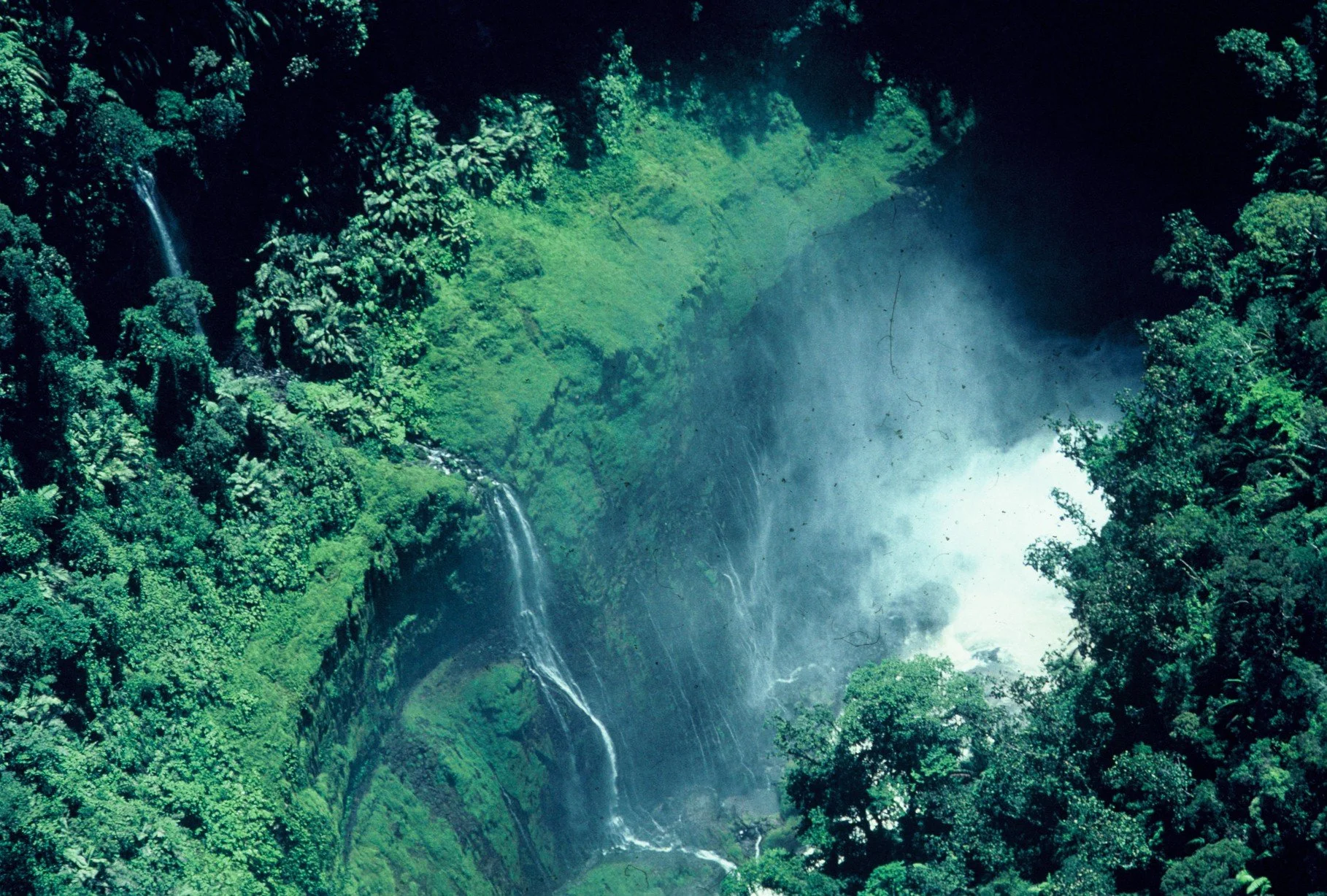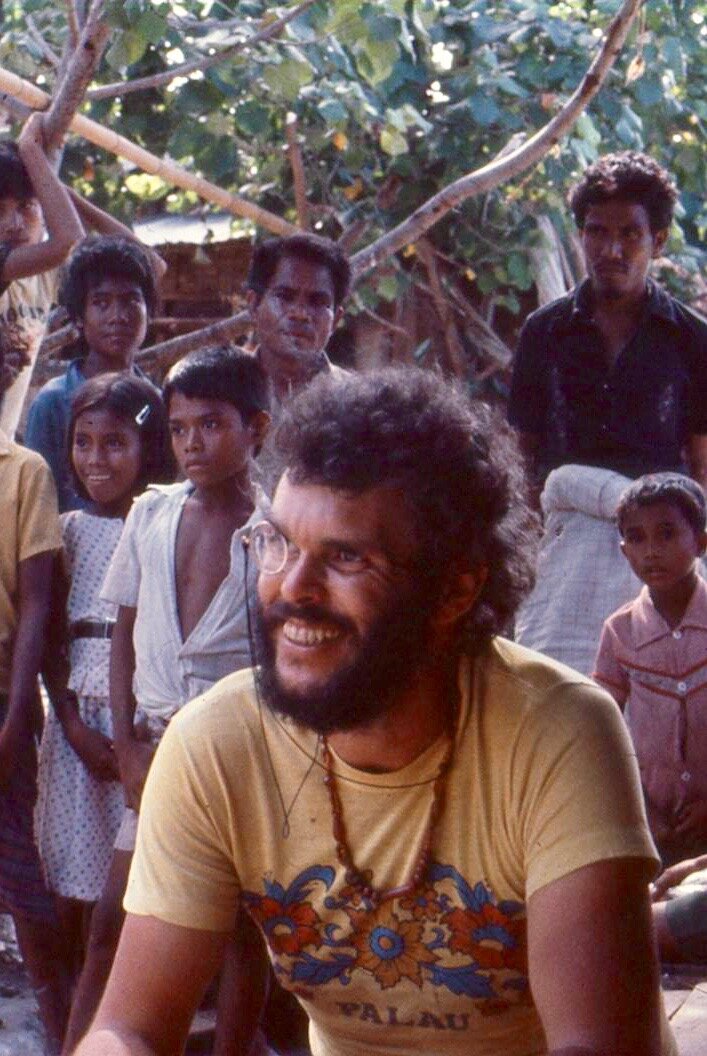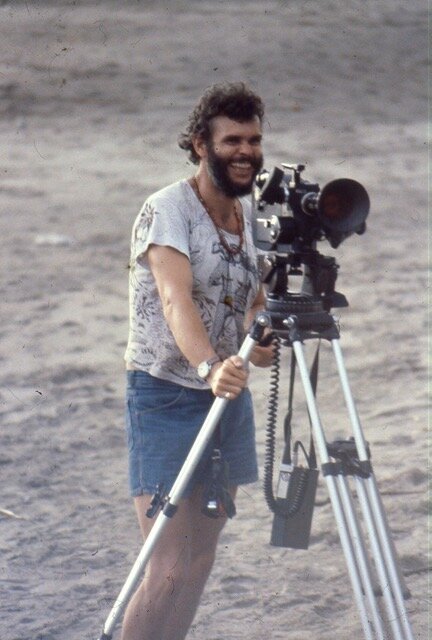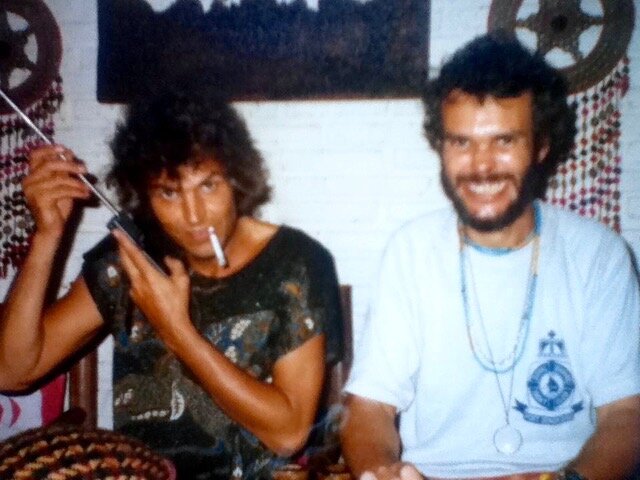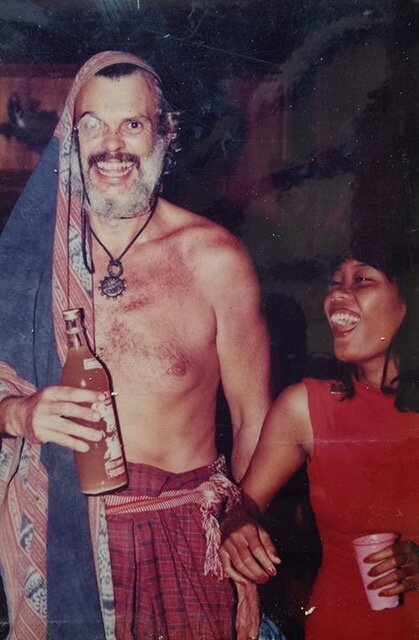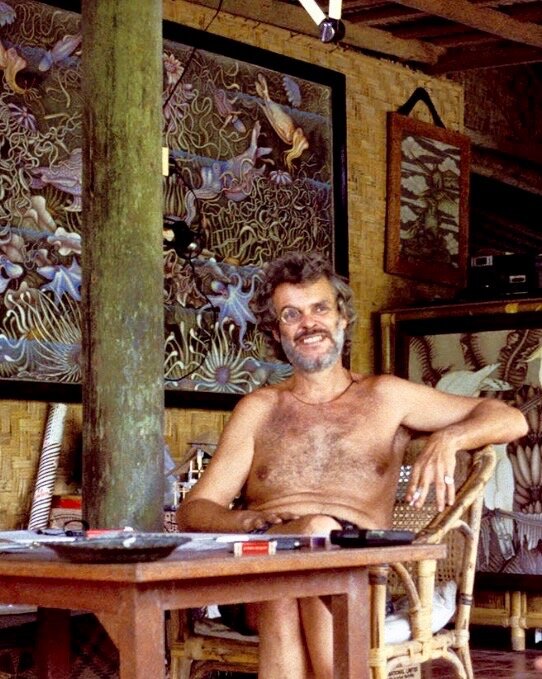Lorne Blair (1945-1995)
A short biography of Lorne, from a brother’s perspective.
My brother Lorne, younger by 3 years, was born in London during that depressed period immediately after the war, of parents who had both rejected their privileged origins to become professional actors. Our father had been badly wounded in North Africa, and was advised to take the family for a long healing spell in the south of France. Lorne, aged 3, was exposed to French before getting a grip on English. He earned his first report card from a nursery school in Cannes, which simply said: ‘folle independence’.
Our parents soon divorced, and we brothers were taken back to a boarding school in the UK. The first order of business at the pre-prep school was to muster all our teddy bears and cremate them. I responded by not just breaking all the rules, but advocating for it. Lorne, however, responded by becoming deeply introverted, and refusing to speak any language at all except for gobblydegook, which only I could understand. I was frequently called out of my classes to interpret for him. This resulted in him being taken to a variety of shrinks and voice therapists, all of whom were entirely unsuccessful.
At our prep school in England, where I was constantly punished, Lorne succeeded in remaining almost invisible. He actually disappeared on a few occasions, causing much alarm, as he could be found nowhere on the expansive school grounds or on the neighboring roads. But he was finally spotted in the branches of a tree, higher than the older boys had climbed, concealed in silence, and with a bag of food he’d collected at meal times to serve as long term survival rations.
He was still largely unintelligible as an 11-year-old, when we were put on a slow boat to Mexico to join our mother and new stepfather, who had emigrated there a year earlier. Mexico transformed our lives and within six months Lorne exploded into speaking both English and Spanish with great flair, which was probably aided by his early love of reading.
In Mexico, he was sent to the American school where instead of picking up the local accent, he forged the precise, posh English for which he later became known as a shipboard lecturer and documentary film narrator. We shared innumerable early adventures: cycling to all corners of Mexico City, from the witch’s markets to crumbling natural history museums, and to the mausoleum of the great General Obregon, where his arm, which had been shot off during the War of Independence, now satisfyingly floated in a clouded aquarium of formaldehyde.
As teenagers we learned to sail in our stepfather’s boats, and how to camp in the desert. We climbed to the 17,800 foot summit of Popocateptel, and we floated, with flashlights, down subterranean rivers in Sonora, which we hoped would eventually spit us out into the sunshine. And off the coasts of both Guerrero and Quintanaroo we learned to dive, in the early days of aqualungs, before Buoyancy Control Devices. As a teenager Lorne was subsequently hired as an assistant diver for the National Geographic magazine’s early explorations of the cenotes of Yucatan, as well as of the 18th Century Matancero wreck, from which he long-kept silver buckles and crucifixes chipped from the coral.
We both attended the University of the Americas in Mexico City, where Lorne, aged 18, alarmed us by disappearing again, this time for 3 months, with three university friends, on his expedition down the Usumacinta river dividing Mexico from Guatemala in search of the little-known Lacandon Indians. He brought back stunning color photographs, plus of a later, solitary expedition to the Apache Indians in Chihuahua, famous for their marathon abilities to run down deer.
As our stepfather ran a successful import export business Lorne was persuaded to take a business degree. But his heart wasn’t in it and just a few weeks before he was due to graduate, he walked out to accept the job of assistant to Bob Cundy, an independent documentary filmmaker for the BBC. It was from Bob that Lorne learned not only the technicalities of movie making with 16mm equipment, but also the art of filming for extended periods in the field.
When he joined me in London as a 23-year-old Lorne’s work with Bob Cundy got him the job as an assistant producer on the BBC’s Money Program, where he strove unhappily for 3 years. The upside was that we shared a flat with two other identical twin brothers in Notting Hill which became a transit point for all sorts of fascinating London luminaries of 60s and 70s, from pop stars to philosophers. Lorne was a keen connoisseur of wine and food, and a very good cook. His dinner parties, for which he cooked everything, were much in demand. He was also extremely funny, and was what you might call a loud dresser, festooning himself in ethnographic finery from around the world.
Although he learned much at the BBC he still longed for the freedom to make his own films of the wider, lesser-known parts of the planet. Thus, in 1972 when the opportunity arose to accept some production money from Ringo Starr, we took off together for nine months filming the first of our Indonesian adventures, which would lead us into a decade of wonders, a fraction of which was captured in our TV Series Ring of Fire. Not only did he carry most of the burden of raising the money, handling the business, and shooting nearly all the film himself, he did it with amazing patience and good will. He was much loved, and even the remotest tribal peoples recognized him as an unusually radiant and compassionate person. ‘Compassionate’ is an old-fashioned word, but what I mean here is that Lorne seemed to view all humans and animals as magical creatures deserving of special care and attention. But on the outside, Lorne was definitely eccentric. He said he grew his beard to conceal his weak chin, which was nonsense. He wore a monocle because he said he was only nearsighted in one eye, and a monocle was harder to break and easier to carry spares for than glasses, which wasn’t nonsense. He even went one whole London winter, to the astonishment of his colleagues at Ringo’s Apple Company, where he was editing the first version of Ring of Fire, wearing no shoes at all, even in the snow. It was part of his tendency to test his limits. On another occasion, after several weeks of lecturing aboard the Lindblad Explorer, enjoying considerable comfort and adulation, he had himself dropped off in the remote island of Savu, from where he eventually returned home to Bali, much thinner, via a series of local, open sailing boats piloted by the Bajo tribe.
In addition to Spanish, Lorne acquired fluent Indonesian, and became an expert on the nation’s treasury of cultures and ethnographic art. Over the years he amassed, mainly from Asian second hand bookshops, a large library of antique and contemporary books on Indonesia.
Lorne’s house in the hills of Bali was his center of operations, and in 1989, after our first shared Bali house had succumbed to termites, he designed and built, with two Javanese carpenters, a complex and wonderful house on stilts, entirely of antique carved teak. From his bedroom in the crow’s nest at the top of the house, before the trees he planted reached the same height, he could see the great Gunung Agung Volcano to the north east, and to the south, the blue waters of the Indian Ocean. He was much loved by the villagers, because of his patience and generosity and his ability to make them laugh. He also became an expert on the local Balinese artists– who’s work he helped to promote, in various exhibitions ranging from London to Los Angeles. In addition to his years in England, Mexico and Indonesia, he also lived for extended periods in Ibiza, The US and Australia, but he was always drawn back to Ubud, which he considered home.
Lorne had the luck of the Irish. He took enormous risks, both financial and physical, and got away with them, until he didn’t. After his first Indonesian adventure, he decided he would live his life on his own terms, which he knew would require major gambles. Perhaps that is what carried him through such an adventurous life. He combined being unusually tough, in the sense of persistent in the face of continuous head winds, with an indiscriminately tender and loving nature. Yet it’s fair to say he was unlucky in love. There was never any shortage of female admirers, and indeed lovers, though the two or three he really cared for escaped him. Just two years before his death in Bali he had a daughter, Xenia. He told me he loved her more than anything or anyone in his life, and he was indeed, for his last years, like a man in love.
His death is more fully described in both the book Ring of Fire, and in the fifth episode of the film series: Beyond the Ring of Fire. But in brief, having lived with cannibals in New Guinea, sailed with pirates through the Moluccas and walked and canoed for some 800 miles through Central Borneo; in 1995, just a few weeks shy of his 50th birthday, he broke his leg falling into an open hole in a Bali street, and died two days later in a local hospital of a stroke. He was not given an anticoagulant.
In addition to the Ring of Fire series, which he directed and largely shot, his achievements include, but are not limited to:
Rhythms of Africa, a film shot with Stewart Copeland, the drummer for the Police.
Lempad of Bali, the prize-winning film about the island’s master artist who died a conscious death aged 116.
River of Gems, a book about returning to the heart of Borneo, vividly illustrated by his friend, the photographer Rio Helmi.
Cycles of the Soul, about the massive funeral ceremony in Ubud, and family history, of the Raja of Gianyar. The film is rarely seen, as it is closely guarded as a ‘pusaka’ by the family who commissioned it, though it continues to be privately shown, with great pride, to presidents and royal households around the world.
At Lorne’s cremation, and the scattering of his ashes off Bali, I was too shocked to weep for him. Every morning, for months, I awoke to the inconceivable scenario that he’d actually gone, slipped from my hands into the abyss, from which we had saved each other on so many occasions. Then one night I awoke from a dream. He and I were in a shop, and at the counter I discovered I didn’t have enough money to pay. I asked him to empty his pockets for me, which of course he did. Never again would I have someone I could ask that of, nor they of me, and I awoke in floods of tears. I had embarked on stage 7 of grief. Acceptance and Hope. What I still wonder is whether the world understands quite what an extraordinary fellow this Lorne Blair actually was.
~
